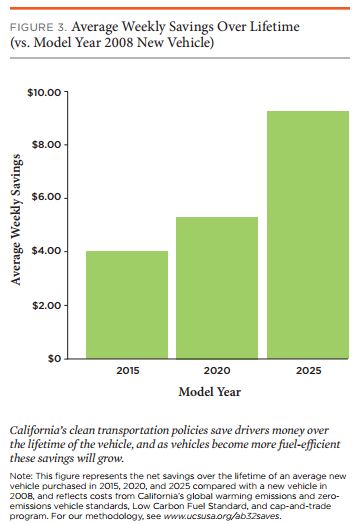As we approach mid-term elections this fall, most folks following politics are interested in how the balance of power may or may not shift in Congress, what new Governors or new legislators may be elected, and what it all may mean for the future of the nation. Many UCS members are particularly concerned about what electoral changes there may be that will influence the future of state and national climate policy. Here in California, we are in the midst of another type of campaign that could have a huge impact in the future of climate policy for the state and region, as well as the whole country: a massive public relations campaign by oil companies to roll back the gains California has made on our groundbreaking climate law, AB32.
You may already know that AB32 is the historic state climate law passed in 2006 that is reducing pollution, saving Californians money, and improving public health—especially in communities that are most affected by air pollution. AB32 currently works to reduce emissions from a variety of sectors, including electricity generation.
Starting on January 1st 2015, the AB32 cap on emissions is scheduled to cover transportation fuels—the largest single source of emissions in California, accounting for nearly 40 percent of California’s total global warming emissions.
Oil companies are standing in the way
Reducing emissions from transportation is a critical step for California to meet its climate goals and help mitigate the costly impacts of climate change. Unfortunately, the oil industry is orchestrating a campaign to convince the public and California’s elected leaders to exempt transportation fuels from the AB32 program.
Hiding behind “Astroturf” front groups with names like “Fed Up at the Pump”, arranging a barrage of paid advertisements and op-eds in local papers by their allies, and increasing campaign contributions to state legislators, oil interests hope to turn back the clock and get transportation fuels out from under requirements to reduce their emissions as now required by law. They are using scare tactics of skyrocketing gas prices to avoid accountability for their carbon emissions and delay the transition to cleaner fuels. They are also using similar tactics in Oregon and Washington to try to prevent the establishment and/or extension of clean fuels policies in those states.
We shouldn’t be fooled by the oil industry’s misleading rhetoric: California’s climate policies are working. That’s why the Union of Concerned Scientists just released new analysis on AB32 that examines how California’s suite of climate and transportation policies are not just investing in communities and reducing the costly impacts of climate change, but are also saving drivers money.
AB32 is saving consumers money
UCS’s transportation experts crunched the numbers and found that the suite of clean transportation policies under AB32 are actually saving consumers money. A California driver who purchases an average new model year 2015 car can expect to save $3.90 each week over the life of the vehicle compared with a driver who purchased a new vehicle in 2008. The comparative savings grow to $5.20 per week for the owner of a new vehicle in 2020 and $9.00 per week for someone buying a new vehicle in 2025.
California’s low-carbon transportation policies will also help those looking to purchase a used vehicle; a 10-year-old used car in 2025, for example, will save its driver $7.50 a week, or nearly $400 a year, over the remaining lifetime of the vehicle compared with a 10-year-old used car purchased in 2015.
AB32 benefits communities
These important policies are also reducing harmful pollution and helping improve public health in disadvantaged communities across the state.
A recent study found that California’s low carbon fuel standard and cap-and-trade programs will save $8.3 billion in health costs between now and 2025 by reducing asthma attacks, hospitalizations, and other health impacts associated with poor air quality.
And, in California’s 2014–2015 fiscal year, more than $200 million in revenues from the state’s cap-and-trade auction will be spent to benefit disadvantaged communities, including investments in public transit and advanced freight technologies such as electric trucks and buses.
What’s next? A call to action
California’s climate policies are reducing carbon emissions, saving consumers at the pump, cutting oil use, and cleaning our air. It’s a clean transportation future that works for all Californians, and sets a leading example for other states—and our federal government—to follow.
It’s critical that the state keep moving forward toward this goal. Let’s not allow the oil industry to stall California’s plan to reduce emissions from transportation fuels.


